Don’t Buy the Hype: U.S. Remains World’s Safe Haven Despite D.C.'s Antics

Washington’s latest manufactured fiscal showdown has sparked fears that foreign investors like China will soon lose their appetite to gobble up U.S. debt.
Those concerns were bolstered on Thursday when a Chinese credit-ratings firm downgraded the U.S., warning a “default crisis” cannot be “substantially alleviated in the foreseeable future” -- even after the bipartisan compromise that was forged in Congress.
But don’t buy into the hype. U.S. Treasurys are still seen as the safest assets in the world and that status is unlikely to change in the short to medium term because few alternatives exist and China is in too deep to dump U.S. debt now.
“China is not going to abandon the Treasury market. They couldn’t if they wanted to. They simply have too many reserves,” said Russ Koesterich, global chief investment strategist at BlackRock (NYSE:BLK), which oversees $1.25 trillion in long-term bond assets and is the world’s largest asset manager.
'They'll Get Over It'
That’s not to say the stream of crises flowing out of Washington hasn’t done damage to the U.S.’s reputation.
Pointing to the “repeated brinkmanship” by political leaders, Fitch put the U.S. on watch for a damaging downgrade earlier this week. Short-term Treasury yields spiked to levels unseen since the collapse of Lehman Brothers.
Standard & Poor’s estimates the government shutdown and debt-ceiling crisis cost the U.S. economy $24 billion.
“People will not forget this,” said Jeffrey Shafer, former undersecretary of the Treasury Department.
"It’s still a very U.S.-dominated global financial system without any real clear alternative."
Yet Shafer and others believe Washington's fiscal shenanigans won’t fundamentally change the way Treasurys or the U.S. dollar are perceived by foreign central banks, major institutions and other global investors.
“They’ll get over it. I think the U.S. is still the ultimate safe haven. The size of our Treasury market makes the U.S. the go-to investment source,” said Greg Valliere, chief political strategist at the Potomac Research Group.
That should be a relief to policymakers and taxpayers alike because if Treasurys were no longer seen as risk-free assets, it would have dramatic consequences on the ability of the U.S. to finance its massive debtload.
One-Month T-Bill Yields Tumble After Deal
A lack of buyers would cause interest rates to spike, raising the cost of credit on everything from car loans and student debt to mortgages. Higher borrowing costs would inflict serious economic damage by slowing already-sluggish growth and sparking layoffs.
“We do not think those fears are justified,” currency analysts at Brown Brothers Harriman wrote in a note to clients on Thursday. The firm cited the fact that Treasury holdings in the Federal Reserve’s custody facility for foreign central banks actually rose by $5 billion last week even as default jitters ratcheted higher.
Without Peers
The willingness of central banks to increase their holdings of U.S. assets highlights the continued role of Treasurys and the greenback as the preeminent safe haven assets.
“The liquidity of the U.S. markets, the breadth of understanding and the infrastructure for clearing makes it the premiere place to hold your liquid assets,” said Shafer.
In addition to having the deepest pool to swim in, the U.S. debt market enjoys a huge advantage because there simply are no legitimate rivals at the moment.
China’s currency is not convertible and the eurozone’s sovereign debt crisis has illustrated the euro’s underlying issues. The currency bloc doesn’t issue its own debt, other than its permanent bailout facility, whose first bond was for a mere 5 billion euros, which is hardly enough to be considered a rival to U.S. debt.
“It’s still a very U.S.-dominated global financial system without any real clear alternative,” said Josh Feinman, global chief economist at DB Advisors, Deutsche Bank’s (NYSE:DB) institutional asset management business.
China’s Conundrum
All of this puts China in an awkward position. It owns too much U.S. debt to get rid of it without hurting itself.
That thinking helps explain why China continues to buy U.S. assets. Beijing’s reserves soared by $164 billion during the third quarter alone.
“The best way for China to reduce its dependence on the dollar and U.S. Treasuries is to stop accumulating reserves. As long as it is accumulating reserves, its dilemma remains in place. What other market is big enough to absorb those proceeds?” Brown Brothers Harriman analysts wrote.
“The Chinese case is particularly ironic. They chose to build up a lot of reserves and imposed on themselves a need to figure out how to invest them,” said Edwin Truman, a former Fed and Treasury official who is now a senior fellow at the Peterson Institute for International Economics.
It’s not just the Chinese who have this issue. Japan and Middle Eastern countries like Saudi Arabia also maintain mountains of currency reserves. Given that they don’t want to own all of a small country’s bond market, they have few choices other than Treasurys.
Of course, there is no guarantee it will always be this way. The financial world has been moving toward currency and foreign debt diversification for many years and that process is likely to continue.
In fact, it’s easy to see how the U.S. fiscal and political problems will encourage China and other countries to speed up those efforts and even attempt to develop their own alternatives to U.S. assets.
“Over the longer-term it will probably accelerate the emergence of (China’s) Renminbi as an alternative reserve currency. But that’s over years, not weeks or months,” said Shafer.



















